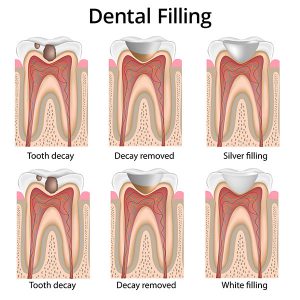 When you first develop a cavity, you may not notice any symptoms. You may even enjoy complete dental function. However, without appropriate care, the decay will spread quickly. You could eventually experience severe discomfort, and you may eventually require root canal therapy or an extraction. Our team offers several restorative dentistry treatments for cavities. Options include fillings, inlays, onlays, and crowns. The most appropriate choice for you will depend on the size of your cavity. Of course, we also offer preventative care to keep decay from developing in the first place. To learn more about treatment for cavities, contact our Bridgeport practice today.
When you first develop a cavity, you may not notice any symptoms. You may even enjoy complete dental function. However, without appropriate care, the decay will spread quickly. You could eventually experience severe discomfort, and you may eventually require root canal therapy or an extraction. Our team offers several restorative dentistry treatments for cavities. Options include fillings, inlays, onlays, and crowns. The most appropriate choice for you will depend on the size of your cavity. Of course, we also offer preventative care to keep decay from developing in the first place. To learn more about treatment for cavities, contact our Bridgeport practice today.
[move_content]
What Is a Cavity?
A cavity results from the interaction between oral bacteria and starches. An accumulation of microbes will lead to the development of plaque and tartar. In turn, these two substances will harbor bacteria, keeping them trapped against your teeth. Sugar and other carbohydrates are the main source of energy for these microbes. When they feed, they will produce acid, which will erode your dental enamel. As this process continues, the bacteria will move deeper into your tooth, and a cavity will develop.
Fillings for Small or Medium Sized Cavities
Typically, we will treat a cavity with a filling. You can choose from several different materials when you receive this type of restoration. A metal filling is the traditional option. Made of gold or silver amalgam, this type of filling is strong and durable. On the other hand, it does not match the color of your tooth. We can also provide tooth-colored fillings, made of ceramic or composite. These materials come in a range of shades, and they will maintain the appearance of your smile. They will also form a stronger bond with your tooth, and they typically require a more conservative preparation process.
Whatever type of filling you choose, your dentist will first clean all the bacteria from your tooth. He will also trim it to remove damaged material and make room for the restoration. The filling itself will seal off and strengthen your tooth to restore the function of your bite.
Treatments for Extensive Decay
Although fillings are the most common treatment for cavities, they are not appropriate for particularly large areas of decay. If you have a severe cavity in one of your molars, your dentist may recommend an inlay or onlay. Your restoration will be custom-crafted from impressions of your tooth, and it will fit over the pointed chewing surface. It can be made from metal or tooth-colored materials, depending on your preferences. The two types of restorations are similar, but they are sized differently. Inlays will nestle between the sharp points of your tooth. Onlays will cover the cusps, going partway down the sides of your tooth.
In cases of severe decay, you may require a dental crown. Like inlays and onlays, a crown will be made from molds of your tooth. You can choose from various materials, and we will help you select the one that most closely corresponds with the natural color of your tooth. A crown encases your damaged tooth, restoring its appearance and functionality. Thanks to our meticulous techniques, your crown will look highly lifelike, and it will preserve the natural alignment of your bite.
Contact Us If You Are Suffering from a Cavity
Cavities do not always have noticeable symptoms. Therefore, it is important to undergo routine exams and cleanings. That way, we can prevent decay and diagnose cavities in the early stages. If you are suffering from dental decay, or if you simply need to schedule a routine visit, contact us today.
